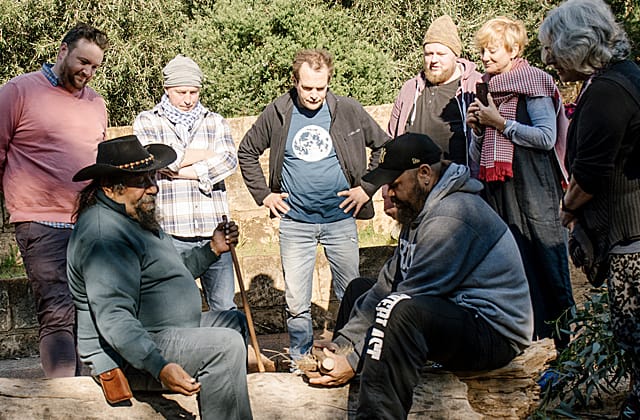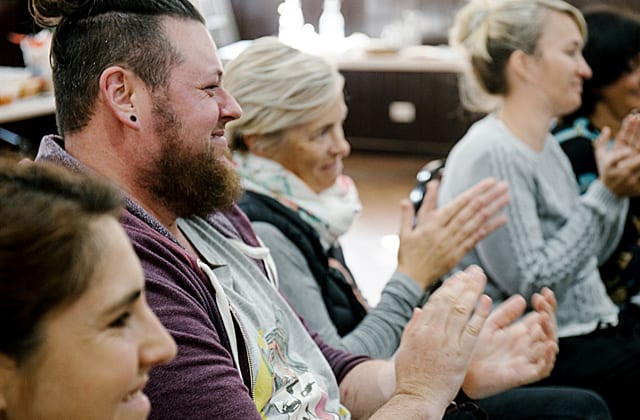Overview
Stemming from a four-year collaborative research project between Creative Recovery Network and Community Arts Network, Creating Well harnesses the experience and wisdom of the sector’s leading practitioners to grow a deeper understanding of the specific support needs for community-based arts workers.
“It is time for action and advocacy to move towards a framework that both instigates and funds programs to support arts workers within the CACD sector. Creating Well is our contribution to the advancement of the national conversation regarding effective self-care and is a direct response to many years of feedback we have received about the physical and emotional challenges people face in community-based practice.”
June Moorhouse, co-CEO, Community Arts Network
Recommendations
Recommendations for Practitioner Wellbeing
The six key recommendations presented in the report, Creating Well: Working Sustainably in Communities, propose a combination of professional supervision, peer support and wellbeing programs, underpinned by a sector-wide practice framework, to support sustained excellence and practitioner wellbeing.
Arising from conversations with a broad cross-section of arts workers and based on best practice models in the health and social services sectors, the recommendations are:
1. Establish a Practice Framework and Code of Conduct
A Practice Framework including a Code of Conduct for practitioners and organisations to support ethical and safe engagement with each other and communities is a long-identified need within the sector.
A CACD Practice Framework will establish a vision for practice that is grounded in the realities of community practice, supported by research and embedded in a set of principles and values that are essential to the work.
2. Build targeted Professional Development Programs
Professional development through training, experiential learning, and formal mentoring programs can address the specialised knowledge and experience required of CACD practitioners and support emerging practitioners in approaching the challenges they will face.
There are currently no coordinated approaches to professional development across the sector. A commitment to establish a national database of opportunities supported by funding from arts organisations and funding bodies to facilitate more development opportunities would support the growth of specialist programs.
3. Establish a Professional Supervision Network
High quality professional supervision is a guided reflection on practice, undertaken through a supportive relationship that is safe enough to positively challenge thinking and practice. Professional supervision promotes optimal care, safety and wellbeing for practitioners, in accordance with organisation and professional standards.
With a Practice Framework in place, a supervisor with a clinical psychological background could be inducted to work within the CACD context or a supervision training course for CACD workers wishing to become supervisors could be implemented.
4. Embed Wellbeing Plans and Professional Supervision into CACD programs
National and state government arts sector bodies and philanthropic organisations have a vital role to play in supporting and funding professional supervision, along with specific wellbeing training for CACD practitioners and organisations.
As key funders of CACD programs and projects, they are central to developing a practice framework to address the needs of a growing CACD workforce.
Contracting organisations need to lead by example. To do this, arts and community organisations presenting CACD programs/projects need to ensure professional supervision and wellness support are embedded into all CACD activity.
It is recommended that all projects include a budget line for professional supervision and that professional supervision is promoted as best practice for all CACD projects and programs.
5. CACD Practitioners Activate and Prioritise Individual Wellbeing Plans
CACD practitioners have a responsibility to maintain professional competence, update knowledge and skills throughout their career, establishing short and long-term professional supervision and wellness programs for themselves when they are working individually or with contracting organisations.
6. Build and maintain a Community of Practice
The research demonstrated that experienced workers may benefit from a non-supervisory link with other workers and that relatively new workers may feel more comfortable problem-solving professional issues with their peers.
Peer support programs are becoming more common as part of an overall approach to psychological health and safety in the workplace, especially growing as standard practice in high-risk organisations.
Join the working party to develop a CACD practice framework.
Creating Well: Recommendations for Practitioner Wellbeing

Research Report
Creating Well: Working Sustainably in Communities, shares the findings of a four-year collaborative research project between Creative Recovery Network and Community Arts Network designed to grow a deeper understanding of the support needs for community-based arts workers and identify the gaps in support that exist within the sector.
The report clarifies the consistent challenges faced in community-based practice and calls for the sector as a whole to evolve towards new standards of practice and a framework to better support practitioners in high performance work environments.
The research process included consultation with arts workers from a range of settings and an extensive professional supervision program with a group of Western Australia-based Community Arts and Cultural Development workers, modelled on best practice models in the health and social services sectors.
The research was undertaken in partnership with psychologist Dr Shona Erskine and researcher Dr Peta Blevins, and included the participation of 19 sector research participants and 13 professional supervision pilot program participants.
Creating Well: Working Sustainably in Communities
